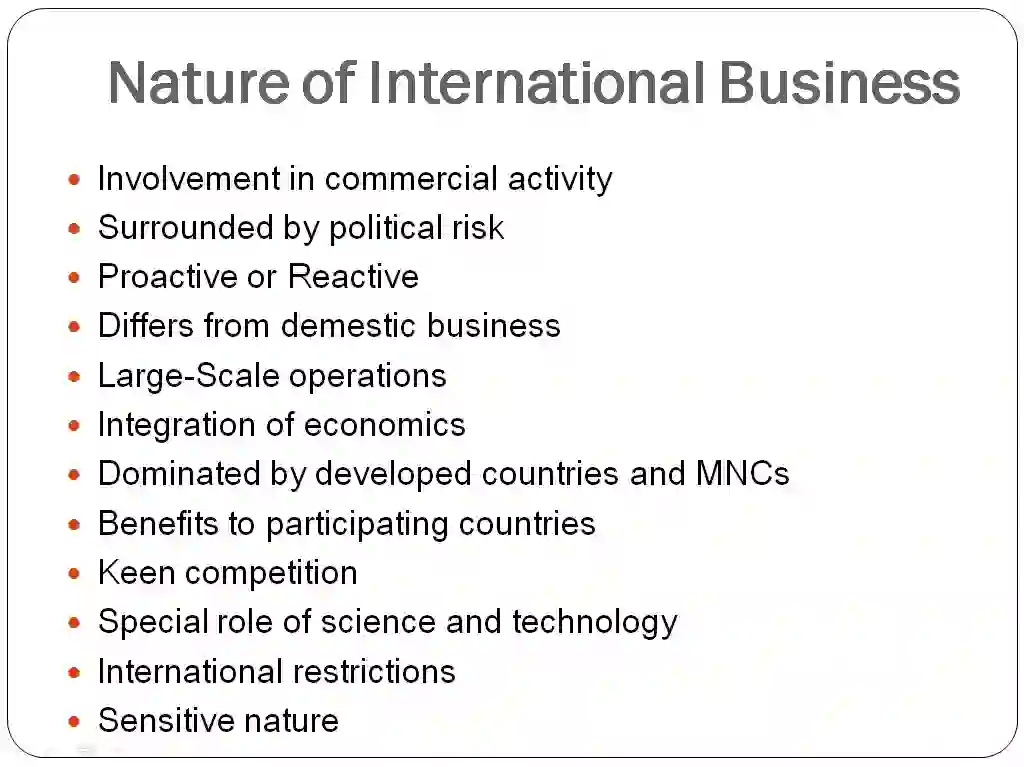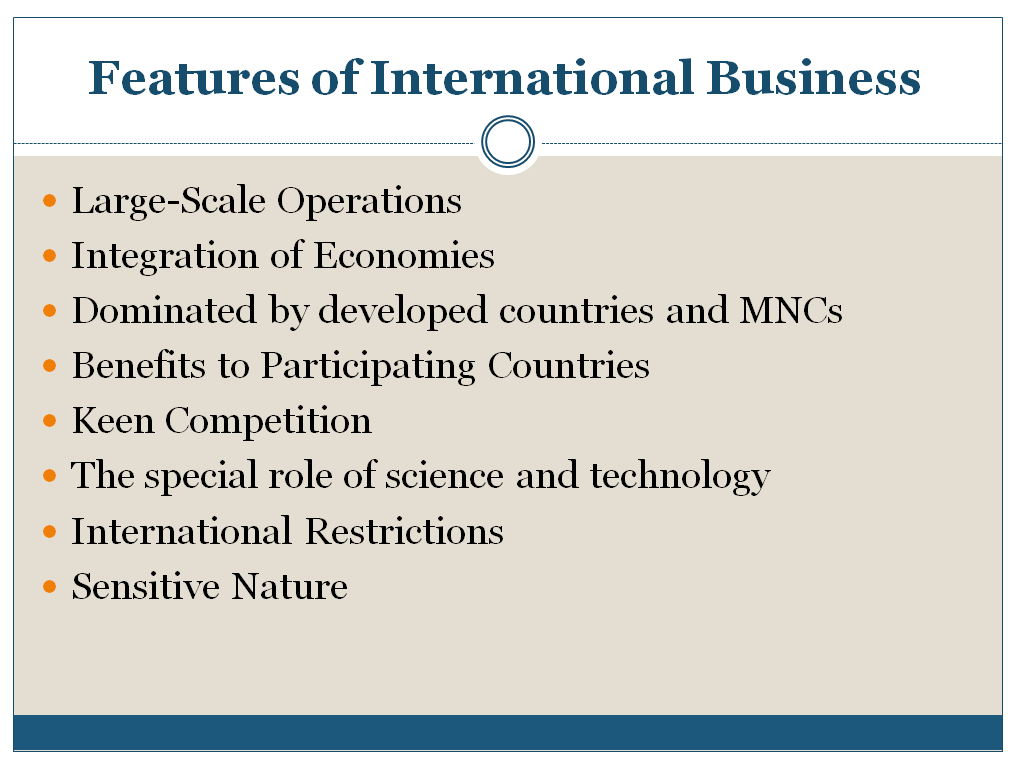Table of Contents:-
- Nature of International Business
- Meaning of International Business
- Definition of International Business
- Scope of International Business
- Features of International Business
- Characteristics of International Business
Nature of International Business
The complexity of the international business environment implies that international businesses carry more risks than purely domestic ones. By understanding the nature of international business companies can easily navigate the challenges that arise, ensuring compliance with regulations and reducing the risk of legal complications.
The nature of international business is explained by the following points:
- Involvement in Commercial Activity
- Surrounded by Political Risk
- Proactive or Reactive
- Differs from Domestic Business
- Large-Scale Operations
- Integration of Economies
- Dominated by Developed Countries and MNCs
- Benefits to Participating Countries
- Keen Competition
- Special Role of Science and Technology
- International Restrictions
- Sensitive Nature

1) Involvement in Commercial Activity
Multinational business includes commercial activities that occur across national borders. It concerns the international movements of goods, capital, services, employees and technology; importing and exporting cross borders transactions in intellectual property (patents, trademarks, know-how, copyright materials, etc.) via licensing and franchising: investments in financial and physical assets in foreign countries etc.
2) Surrounded by Political Risk
International managers are required to consider the political risk of operating in foreign environments, factor changes in foreign exchange values into their decisions, and be aware of how national and cultural forces affect their marketing measures. All these changes make global business risky and complex.
3) Proactive or Reactive
International expansion commonly can be seen as either proactive or reactive. Proactive international ventures take advantage of perceived opportunities; reactive ventures respond to actions taken by other parties or safeguard against perceived threats.
Related Articles:
- scope of international marketing
- determinants of economic development
- nature of capital budgeting
- nature of international marketing
4) Differs from Domestic Business
Multinational business differs from purely domestic business because it involves operating effectively within different national sovereignties; under widely disparate economics; with people living within different value systems and organisations; as part of an industrial revolution set in the contemporary world, often over a greater geographical distance; & in national markets varying greatly in population and area.
5) Large-Scale Operations
In global business, all the processes are conducted on a very massive scale. Marketing and production are conducted on a large scale. It first sells its goods in the regional market. Then the surplus goods are exported.
6) Integration of Economies
The multinational business incorporates (combines) the economies of many countries. This is because it utilizes finance from one country, labour from another country, and infrastructure from yet another country.
It designs the product in one country, produces its parts in many foreign countries and assembles the product in another country. It sells the product worldwide, i.e., in the international market.
7) Dominated by Developed Countries and MNCs
Global business is dominated by developed nations and their multinational companies(MNCs). At present, MNCs from the U.S.A., Europe and Japan dominate (fully control) foreign trade. This is because they have enormous economic and other resources.
They also have the finest technology and research and development (R&D) resources. They have highly skilled employees and managers because they give high salaries and additional benefits. Hence, they produce good quality goods and services at lower costs. This helps them to capture and dominate the entire market of the world.
8) Benefits to Participating Countries
International business offers benefits to all participating countries. However, the rich and developed nations get the maximum benefits. The developing (poor) countries also get benefits. They get foreign capital and technology.
These countries have rapid industrial development. They get more employment opportunities. All this results in the financial development of developing countries. Hence, developing countries open up their economies through liberal financial policies.
9) Keen Competition
The multinational business has to face keen and too much competition in the world market. The competition is between unequal partners, i.e., developed and developing nations.
Developed countries and their MNCs are in a good position in this keen competition because they produce superior quality goods and services at meagre prices. Developed countries also have many connections in the world market. So, developing countries find it very tough to face competition from developed countries.
10) Special Role of Science and Technology
The multinational business gives a lot of significance to science and technology. Science and Technology (S&T) help the business to have large-scale production.
Developed countries use high technologies. Therefore, they dominate global business. The multinational business helps them to transfer high-end technologies to developing countries.
11) International Restrictions
A global business has to deal with many regulations on the inflow and outflow of goods from various countries. They have many tariff barriers, trade blocks, foreign exchange restrictions, etc.
All this is harmful to capital, technology and goods. Many governments do not allow global businesses to enter there to global business.
12) Sensitive Nature
Multinational business is very sensitive. Any changes in economic policies, technology, political environment, etc., have a huge impact on it.
Thus, multinational companies must conduct marketing research to find and study these changes. They must adjust their business activities and adapt accordingly to survive changes in the business environment.
Meaning of International Business
International Business refers to the exchange of goods and services between different parties of two or more countries. IB may be understood as those business transactions involving the crossing of national boundaries.
Global business strategy is the systematic approach that directs an organization’s resources and goals towards capitalizing on international opportunities and mitigating potential threats.
International business means carrying on business activities past national boundaries. International business is the conduct of business activities with people outside of one’s own country.
These activities commonly include the transaction of economic resources such as capital, goods, services (comprising technology, skilled labour, transportation, etc.), and international production.
Production may either involve the production of physical goods or the provision of services like banking, finance, insurance, construction, trading, and so on. Thus, global business comprises not only international trading of goods and services but also foreign investment, mainly foreign direct investment.
Definition of International Business
According to Robock and Simmonds, “International business is defined as a field of management training (that) deals with the special features of business activities that cross national boundaries”.
As per Czinkotra Grosse and Kujawa, “International business is defined as transactions devised and carried out across international borders to satisfy corporations and individuals”.
International business comprises all commercial transactions private and governmental between two or more nations. Private companies undertake such transactions for profits, and governments may or may not do the same in their transactions. These transactions include investments, sales and transportation.
At one end IB is defined as, the organisation that buys and/or sells goods and services across two or more national boundaries, even if management is located in a single country. On the other end, multinational business is defined as it is equated only with those big enterprises that have operating units outside their own country.
In the middle, there are institutional arrangements that deliver some managerial direction of economic activity taking place abroad but stop short of controlling ownership of the business taking on the activity, e.g., The joint venture with locally owned businesses or with foreign governments.
Scope of International Business
The scope of international business is much broader involving the following points:-
- International investments,
- International marketing management of foreign exchange,
- Procuring international finance from IBRD,
- IMF,
- International Finance Corporation (IFC),
- International Development Association (IDA), etc.,
- Management of international human resources,
- Management of international production and logistics planning,
- Management of cultural diversity,
- International strategic management.
Features of International Business
Features of international business are as follows:
- Large-Scale Operations
- Integration of Economies
- Dominated by developed countries and MNCs
- Benefits to Participating Countries
- Keen Competition
- The special role of science and technology
- International Restrictions
- Sensitive Nature
Large-Scale Operations
In an International business environment, all the business operations such as production and marketing activities are conducted on a very large scale. Companies first sell their goods in the local market and then the surplus goods are exported.
Integration of Economies
The global business integrates the economies of numerous countries by leveraging labour from one nation, financial resources from another, and infrastructure from yet another. It designs the product in one country, produces its parts in different countries, assembles it in another country and sells it worldwide.
Dominated by developed countries and MNCs
Multinational business is dominated by developed countries and their multinational companies. Europe and Japan dominate foreign trade, this is because they have high financial and other resources.
Benefits to Participating Countries
Global business benefits all the participating countries. However, the developed countries get the maximum benefits compared to the developing countries. They get foreign capital and technology. Developed countries get rapid industrial development. They get more employment opportunities.
Keen Competition
Global Business has to face competition in the international business environment. The competition is between unequal partners. In this situation, the developed countries are in a favourable position as they produce superior quality goods and services, but developing countries find it difficult to face competition.
The special role of science and technology
The pivotal role of science and technology holds immense significance in the international business environment. It helps the business to have large-scale production. Developed countries use high technology. It helps them to transfer top-end technology to developing countries.
International Restrictions
Multinational companies face many restrictions on the inflow and outflow of capital, technology, and goods. Many governments do not allow international business to enter their countries.
They have many trade blocks, foreign exchange restrictions, tariff barriers, etc. All these factors pose significant challenges to international business which have detrimental effects on the international business.
Sensitive Nature
Multinational business by its very nature is very sensitive. Any changes in technology, economic policies, and the political environment of business have a huge impact.
Therefore, it must conduct marketing to find and analyse these changes. They must adjust their business activities and adapt accordingly to survive changes in the business landscape.
Characteristics of International Business
Characteristics of International Business are as follows:-
1. It involves two or more countries.
2. Use of diverse currencies.
3. It helps in global market expansion.
4. It involves Legal and Regulatory Compliance.
5. Companies involved in global business may have financial risks.
6. It includes cultural diversity.
7. It requires accurate information to make informed decisions.
8. Multinational business requires accurate and timely information.
9. It segments its markets based on the geographic market segment.
The term international business was not popular for two decades. It has emerged from the term ‘international marketing’, which in turn appeared from the phrase “International Trading”.
International Trade to International Marketing
Initially, producers exported their products to nearby nations and gradually expanded exports to foreign countries. Gradually, the companies extended their operations beyond trade.
For example, India used to export raw jute, raw cotton, and iron ore during the early 1900s. The massive industrialisation in the country enabled India to export steel, jute products and cotton garments during the 1960s.
India, during the 1980s, could create markets for its products, in addition to mere exporting through export marketing efforts to generate demand for Indian products like textiles, electronics, leather products, tea, coffee, etc. This process is true not only with India but also with nearly all developed and developing nations of the world.
International Marketing to International Business
The multinational companies that were producing the products in their home countries and marketing them in different foreign countries before the 1980s started locating their plants and other manufacturing facilities in foreign/host countries. Later, they started producing in one foreign country and marketing in another country.
For example, Unilever established its subsidiary company in India, namely Hindustan Lever Limited (HLL). HLL produces its products in India and markets them in Sri Lanka, Bangladesh, Nepal, etc. Thus, the scope of international trade has been expanded into international marketing and international marketing has been expanded into a multinational business.
Developments and issues in international business
International Business is increasingly recognized as a necessary engine for economic development. Developments in international business are driving the increasing pace of transactional systems development efforts.
Many multinational corporations are suffering from organisational paralysis caused by the need to continue the operation of systems which are most often broken down into many different “warring factions” strung around the world from one location to another.
Probably developments and issues most discussed concerning international business include major mergers and acquisitions from and into India. The huge strategic alliances are the most interesting issue of the global trade scenario. Whereas, outsourcing is considered the trend and issue for international business.
You may also like:-
Reasons for International Business
Major Reasons for International Business
Factors Affecting International Business
Modes of Entry into International Business
Importance of International Business
Difference between Domestic and International Business
Complexities of International Business
Importance of International Business Environment
Components of International Business Environment
Impact of Globalisation on International Business
Determinants of Economic Development

